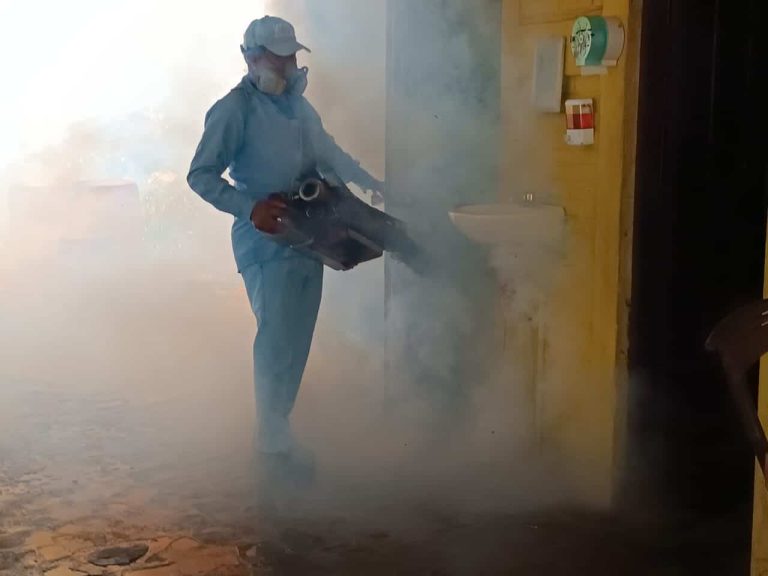9 de abril 2024

Children of Exile: The Births “Sowing Hope” in the Camp of Nicaraguan Farmers

PUBLICIDAD 1M
PUBLICIDAD 4D
PUBLICIDAD 5D
So far in 2024 more than 28,251 cases of dengue have been reported in Nicaragua. 80% more than during the same period a year ago

In 2023, Nicaragua experienced its worst dengue outbreak in the previous five years. Photo: Silais Managua
The Pan American Health Organization (PAHO) warns that the global increase in temperatures and extreme weather phenomena such as El Niño, are causing an unusual increase in the number of dengue infections, making it "the worst dengue season ever in the Americas".
"Last year there were 4.5 million cases, and so far this year we already have 3.5 million cases, making this probably the worst dengue season ever in the Americas," said PAHO director Jarbas Barbosa.
Dr. Barbosa added that "it is therefore very important that countries that are experiencing an increase in transmission double their efforts to prevent the spread [of dengue]."
In addition to climatic factors, rapid population growth and unplanned urbanization also play a role.
"Poor housing conditions and insufficient water and sanitation services create breeding grounds in discarded objects and recipients used to store water," Barbosa said.
The number of infections mentioned by Barbosa was from data up to mid-March 2024, but according to PAHO data that goes up to April 4, the number of infections now exceeds four million, with 1,247 deaths attributed to dengue.
According to the data, 92% of the infections and 87% of the deaths are occurring in Brazil, Paraguay and Argentina. The increase in these countries is related to the warm and rainy weather that prevails at this time of the year that leads to a greater spread of dengue.
Barbosa noted that "we are also seeing an increase in countries such as Barbados, Costa Rica, Guadeloupe, Guatemala, Martinique and Mexico, where transmission tends to be higher in the second half of the year."
The presence of the transmitting Aedes aegypti mosquito has also been detected "in geographic areas where endemic transmission had not been [previously] observed, which means that some countries may not be prepared to cope with an increase in transmission," warned Barbosa.
Addressing the seriousness of the situation, PAHO called on all countries to support prevention efforts and intensify the elimination of breeding sites, the most important measure to prevent the spread of dengue, given that vaccines are still in very early stages of development and are not yet an effective method to stop the spread.
Nicaragua is the country reporting the highest number of suspected dengue infections in Central America. As of February 27, when the Ministry of Health (MINSA) published its latest epidemiological bulletin, there were 28,251 suspected cases, an 80% increase over the 15,682 reported during the same period last year.
Since then, MINSA authorities have remained silent on how the epidemic has evolved. The latest report submitted to PAHO's monitoring system only covers the period up to the beginning of February.
MINSA’s website has not posted an epidemiological bulletin in more than five weeks. The only information that has been made public are short weekly press releases published in the regime’s propaganda media outlets.
MINSA’s press releases state only the number of cases confirmed by the official MINSA laboratory. Those numbers are up to 18 times lower than the number of suspected cases, as laboratory tests are not done on all patients. In the most recent press release, MINSA states that the number of confirmed cases has decreased.
Of the more than 28,000 suspected cases of dengue fever that have been reported in Nicaragua, MINSA’s laboratory has confirmed 1,545 infections.
After Nicaragua, the Central American country with the most reported cases is Guatemala with 9,256, followed by Honduras with 6,933, Costa Rica with 6,013, Panama with 4,209, El Salvador with 1,101 and Belize with 386.
Although Nicaragua is the country with the highest incidence, MINSA has not reported a single death due to dengue. Panama and Honduras have reported seven deaths each, and Guatemala five.
In 2023, Nicaragua reported four deaths due to dengue, which were included in regional statistics several months after they occurred.
In the context of the dengue outbreak, PAHO recommended that each country’s Ministry of Health prepare public and private health services as well as train health personnel for the early diagnosis and timely clinical management of dengue patients.
Barbosa explained that efforts must be redoubled to inform and educate the population, as most of the dengue outbreaks are in or near people’s homes.
In some countries, such as Brazil, vaccines against dengue are already being used, but "it will take many years for them to work to prevent transmission," according to Daniel Salas, executive manager of PAHO's immunization program, who added that "there is currently very limited production."
Therefore, government efforts should focus primarily on eliminating mosquito breeding sites in areas with stagnant water.
*With information from EFE
This article was published in Spanish in Confidencial and translated by our staff To get the most relevant news from our English coverage delivered straight to your inbox, subscribe to The Dispatch.
PUBLICIDAD 3M
Confidencial es un diario digital nicaragüense, de formato multimedia, fundado por Carlos F. Chamorro en junio de 1996. Inició como un semanario impreso y hoy es un medio de referencia regional con información, análisis, entrevistas, perfiles, reportajes e investigaciones sobre Nicaragua, informando desde el exilio por la persecución política de la dictadura de Daniel Ortega y Rosario Murillo.
PUBLICIDAD 3D